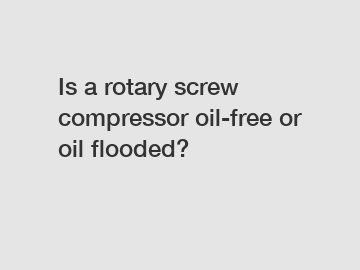Dec. 22, 2023
Machinery
AirHorse contains other products and information you need, so please check it out.
Is a rotary screw compressor oil-free or oil flooded?
As industrial processes continue to evolve and become more sophisticated, the demand for efficient and reliable air compressors has grown. Among the various types of compressors available, rotary screw compressors have gained significant popularity due to their durability, low maintenance requirements, and high output capabilities. However, a common debate in the industry revolves around whether these compressors are oil-free or oil-flooded. Let's delve into this topic and explore the characteristics, advantages, and disadvantages of both types.

1. Oil-Free Rotary Screw Compressors:
Oil-free rotary screw compressors, as the name suggests, operate without the need for oil in the compression chamber. Instead, they rely on specialized coatings and materials to minimize friction and enhance the efficiency of the compression process.
a. Advantages:
- Zero risk of oil contamination: In applications where air quality is critical, such as in pharmaceutical or food processing industries, oil-free compressors are the preferred choice. They eliminate the risk of oil carryover, ensuring the purity of the compressed air.
- Lower maintenance costs: Since oil-free compressors lack lubrication systems, they require less maintenance and have fewer components that can fail or wear out.
- Energy efficiency: With advanced technology, such as variable speed drives, oil-free compressors can optimize energy consumption by matching the air output to demand.
b. Disadvantages:
- Higher initial costs: Oil-free compressors incorporate specialized coatings and materials, making them more expensive to manufacture than their oil-flooded counterparts. However, the long-term benefits often outweigh the initial investment.
- Limited capacity: Oil-free screw compressors are generally smaller and have a lower capacity compared to their oil-flooded counterparts. This makes them more suitable for applications with lower air demands.
2. Oil-Flooded Rotary Screw Compressors:
Oil-flooded rotary screw compressors, on the other hand, rely on oil for various functions within the compression process. Oil is injected into the compression chamber, which cools and lubricates the rotors, reducing both internal friction and heat.
a. Advantages:
- Higher capacity: Oil-flooded compressors have a higher capacity and are better suited for applications with larger air demands, such as industrial manufacturing or construction projects.
- Longer lifespan: The presence of oil in the compression chamber helps reduce wear on the rotors and other components, resulting in a longer lifespan for the compressor.
- Quieter operation: The lubricating properties of oil contribute to smoother operation, reducing noise levels compared to oil-free alternatives.
b. Disadvantages:
- Risk of oil contamination: While proper maintenance and filtration systems can minimize the risk, oil-flooded compressors have a potential for oil carryover, which may contaminate the compressed air.
- Higher maintenance costs: Oil-flooded compressors require regular oil changes, filter replacements, and overall maintenance of the lubrication system. Additionally, there is a higher chance of components wearing out due to the presence of oil.
Considering the advantages and disadvantages of both oil-free and oil-flooded rotary screw compressors, it becomes evident that the choice depends on the specific requirements of the application. If air purity and contamination risk are critical factors, such as in cleanroom environments or sensitive manufacturing processes, investing in an oil-free compressor is advisable. On the other hand, industries with higher air demands and a lower risk of oil contamination can benefit from the higher capacity and longer lifespan offered by oil-flooded compressors.
In conclusion, whether a rotary screw compressor is oil-free or oil-flooded depends on the intended use and the specific needs of the application. Both types have their merits and drawbacks, and considering factors such as air quality requirements, maintenance costs, energy efficiency, and capacity is vital in making an informed decision. Choose wisely and ensure the compressor aligns with your business's unique needs for optimal performance and air quality.
You can find more information on our web, so please take a look.
Contact us to discuss your requirements of Low Pressure Air Compressor. Our experienced sales team can help you identify the options that best suit your needs.
Previous: Efficient Corn Oil Making Machine: The Ultimate Guide
Next: Revolutionize Grinding Efficiency with Coarse Hammer Mill
If you are interested in sending in a Guest Blogger Submission,welcome to write for us!
All Comments ( 0 )